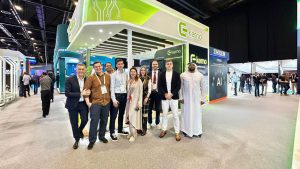DUBAI / GULF TIME
Kerno, the UAE’s pioneering manufacturer of enterprise-class infrastructure solutions, will unveil its latest AI computing technologies at AI Everything Global 2025 in Dubai on February 5 and 6. The company’s showcase will be headlined by its groundbreaking Composable AI infrastructure solution, developed in partnership with Dubai Silicon Oasis-based Qiada R&D.
The UAE’s rapid digital transformation has sparked unprecedented demand for advanced computing infrastructure. The country’s server market is projected to reach $421 million by 2029 , growing at an annual rate of 10.89%. This growth extends across the GCC region, where the server market is expected to hit $1.05 billion by 2029 , driven by increasing investments in AI and cloud technologies.
“The Middle East is witnessing a fundamental shift in how enterprises approach AI implementation. Local organisations are moving beyond experimental AI projects to building production-scale AI infrastructure. This transition demands not just powerful computing resources, but intelligent, flexible architectures that can adapt to evolving AI workloads,” said Demetrio Russo, CEO of Kerno.
Kerno’s Composable AI infrastructure represents a significant advancement in this space. The solution allows organisations to dynamically allocate GPUs and storage capacity for dedicated expansions across PCIe lanes, addressing a critical challenge in AI infrastructure — the underutilisation of expensive GPU resources. This approach is particularly valuable for the region’s growing multi-tenant GPU clouds and AI-focused data centres.
At AI Everything, Kerno will demonstrate its comprehensive AI computing portfolio. The exhibition will showcase the company’s advanced air-cooled and liquid-cooled servers alongside dedicated GPU and NVMe PCIe enclosures. These hardware innovations are complemented by Kerno’s purpose-built orchestration software and software-defined storage solutions, all based on production-grade open-source technology.
“Traditional GPU server architectures often struggle with resource allocation and scaling,” Russo explained.
“Our Composable AI infrastructure enables organisations to pool and schedule AI workloads with unprecedented efficiency,” he said.
“This flexibility is crucial for the Middle East’s emerging AI ecosystem, where organisations must rapidly adapt their computing resources to changing demands.”
The company’s presence at AI Everything follows a year of significant achievements. Since its founding in 2023 by industry veterans from Nokia and IBM, Kerno has established itself as a key player in the UAE’s technology manufacturing sector. The company joined the UAE Ministry of Economy’s NextGenFDI program in February 2024, aligning with the nation’s “Make It In The Emirates” initiative to develop local manufacturing capabilities.
Following strategic partnerships, Kerno is establishing an advanced hardware manufacturing factory in Dubai Silicon Oasis. The facility will utilise best-in-class equipment, including cutting-edge surface mount technology and a fully automated unit assembly line, positioning Kerno as a leading manufacturer of enterprise-class IT solutions in the Middle East. The company is now delivering market-ready product samples to customers, with mass production of enterprise-class servers, AI servers, and storage systems scheduled to begin in Q3/Q4 2025 for both regional and international markets.
The collaboration between Kerno and Qiada R&D exemplifies Dubai’s growing role as a technology innovation hub. Together, they are developing energy-efficient AI computing platforms that combine high performance with sustainability — a crucial consideration for the region’s next-generation data centres.
“Our vision extends beyond manufacturing,” adds Evgeny Ostrovskiy, Chief Revenue Officer of Kerno. “We’re building an ecosystem that supports the UAE AI and digital ambitions through locally developed, globally competitive technology solutions. AI Everything provides an ideal platform to showcase how regional enterprises can leverage locally made compute infrastructure to accelerate the real-life implementations of AI at scale.”
 The Gulf Time Newspaper One of the finest business newspapers in the UAE brought to you by our professional writers and editors.
The Gulf Time Newspaper One of the finest business newspapers in the UAE brought to you by our professional writers and editors.
